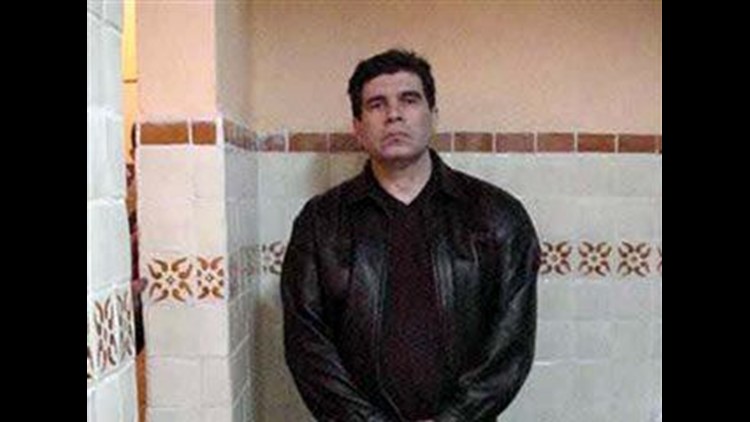MEXICO CITY (AP) — One of the first Mexican drug kingpins to oversee mass shipments of cocaine was extradited to the United States on Friday to face drug-trafficking charges, ending an eight-year effort by U.S. authorities to take custody of a man who once controlled one of the world's most powerful cartels.
Benjamin Arellano Felix, who allegedly led the Tijuana cartel from its beginnings in the late 1980s, is one of the highest-profile drug suspects to be extradited under the administration of President Felipe Calderon.
The cartel's power began to wane after Benjamin was captured by the Mexican military in 2002 in central Mexico, ending more than a decade as a terrorizing force while his cartel moved tons of cocaine from South America to the U.S.
"He led the cartel at the height of its power," the Mexican Attorney General's Office said in a statement. "He was also who kept the family together."
Mexican federal agents handed Arellano Felix over to U.S. marshals at an airport on the outskirts of Mexico City on Friday, the statement said.
He is scheduled to be arraigned Monday before U.S. District Judge Larry Burns in San Diego. U.S. authorities hailed the development.
"The extradition of Benjamin Arellano Felix is one of many great victories against this criminal enterprise," said Michele Leonhart, administrator of the Drug Enforcement Administration.
Arellano Felix was the most significant of 11 people charged in a 2003 federal indictment in San Diego that alleged the cartel was behind widespread violence along California's border with Mexico dating back to 1986.
He was the cartel's "principal organizer and top leader" who oversaw all major decision, including the movement of drugs across the border and their sale in the United States, according to the indictment.
John Kirby, a former federal prosecutor who co-wrote the indictment, said he was shocked that Arrellano Felix was headed to the United States.
"From what we learned during the course of the investigation, Benjamin is sort of the head of the organization and he had ties and conversations with pretty significantly high-up national politicians in Mexico," Kirby said. "Nobody in the high circles of the Mexican government would want him to come here and tell his story."
The cartel, which rose to prominence in the late 1980s, got away with crimes by bribing soldiers and prosecutors to protect high-ranking cartel members and drug shipments, authorities say.
Mexican authorities killed a brother, Ramon Arellano Felix, in a shootout in the Pacific resort city of Mazatlan in February 2002, a month before Benjamin Arellano Felix was captured in the city of Puebla.
Ramon was the enforcer, and Benjamin was the mastermind, investigators say.
Younger brother Javier Arellano Felix was captured by the U.S. Coast Guard on a fishing boat in international waters off the Mexican coast in 2006 and was sentenced to life in prison in 2007.
A fourth brother, Eduardo Arellano Felix, was captured by Mexican authorities in 2008. He was indicted in San Diego, and proceedings to extradite him to the U.S. are under way.
Kirby said Benjamin Arellano Felix and the other defendants in the San Diego indictment were charged with racketeering conspiracy, making them ineligible for the death penalty in an effort to increase their chances of winning extradition from Mexico, which opposes the death penalty.
Since the Arellano Felixes have died or been put in jail, the power of the cartel has diminished as the Sinaloa drug cartel led by Joaquin "El Chapo" Guzman has gained more clout.
A nephew of the brothers, Fernando Sanchez Arellano, known as "the Engineer," now leads the cartel, authorities say. The Mexican Attorney General's Office is offering a reward of $2.5 million (30 million pesos) for information leading to his capture.
More than 34,600 people have been killed in drug-related violence throughout Mexico since December 2006, when Calderon took office and launched a military-led offensive against the cartels.
Calderon has been more willing than many of his predecessors to extradite drug suspects to the United States. His administration has sent 415 people north of the border, including Gulf cartel leader Osiel Cardenas, who was sentenced to 25 years in federal prison last year.
In the past, Mexican authorities had insisted on prosecuting their own criminals at home. They gradually changed their position as a way to stop cartel leaders from communicating with their cohorts from behind bars and from staging prison escapes.
Also Friday, the Mexican army announced the rescue of 52 illegal migrants kidnapped by unidentified drug gangs in Reynosa, a border city across from McAllen, Texas.
Soldiers carried out the operation early Friday in a residential neighborhood after they received an anonymous tip, the army said in a statement.
Among those freed were 34 Hondurans, 12 Guatemalans, five Salvadorans and a Nicaraguan.
In the past two weeks, authorities have rescued 171 people in Reynosa who were kidnapped before trying to cross into the United States. Authorities blamed the Gulf cartel for the kidnapping of 68 victims who were rescued last week.
___
Associated Press writers Elliot Spagat reported this story from San Diego and Adriana Gomez Licon from Mexico City.
Copyright 2011 The Associated Press.



